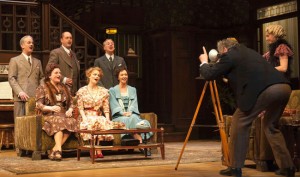In today’s Wall Street Journal drama column I file the first of two reports from Ontario’s Shaw Festival. This week I discuss a rare North American revival of J.B. Priestley’s When We Are Married and a new production of George Bernard Shaw’s Arms and the Man. Here’s an excerpt.
* * *
When a popular playwright stops being performed, there’s usually a reason—though not always a good one. Take J.B. Priestley, whose comedies and dramas were immensely successful in England in the ‘30s and ‘40s and continue to be performed there with fair frequency, but are almost completely forgotten in the U.S. Indeed, Remy Bumppo Theatre Company’s galvanizing 2013 Chicago revival of “An Inspector Calls” was the first time I’d ever seen a live performance of a Priestley play. Now Canada’s Shaw Festival is mounting “When We Are Married,” his biggest hit, and it turns out to be a consummately crafted 1938 farce that’s as funny as anything by George S. Kaufman and Moss Hart and even more stageworthy than “An Inspector Calls.” So why haven’t you heard of it?
The answer is two-fold. Not only is “When We Are Married” a “well-made” three-act play of the kind that went out of style in the ‘50s, but it requires, like the Kaufman-Hart comedies, a large cast—eight men, seven women—making it prohibitively hard for cash-strapped companies to mount. But it’s still well within the reach of community theaters and the bigger summer festivals, and the Shaw Festival’s production, staged with exhilaratingly exact comic timing by Joseph Ziegler and performed by the strongest ensemble cast I’ve seen so far this year, is ideal in every way.
 “When We Are Married” is a farce about three long-married, impenetrably smug bourgeois couples who pride themselves on being “respectable folk” but discover midway through the first act—as do their cheeky servants—that they’re not quite as “respectable” as they supposed. All manner of humiliating hell immediately breaks loose…
“When We Are Married” is a farce about three long-married, impenetrably smug bourgeois couples who pride themselves on being “respectable folk” but discover midway through the first act—as do their cheeky servants—that they’re not quite as “respectable” as they supposed. All manner of humiliating hell immediately breaks loose…
You can always count on seeing the plays of George Bernard Shaw produced at the Shaw Festival with great skill and imagination. Morris Panych, who did a splendid job with Somerset Maugham’s “Our Betters” last summer, has done equally well and even more imaginatively by “Arms and the Man,” Shaw’s 1894 “anti-romantic comedy” (his phrase) about Captain Bluntschli (Graeme Somerville), a thoroughly cynical Swiss mercenary who falls in love with Raina (Kate Besworth), a fluttery young maiden from Bulgaria who believes, unlike her beau, that war is great and glorious….
Shaw’s purpose in writing “Arms and the Man” was to use his sharp wit to poke holes in the “heroic ideals” to which Raina naïvely subscribes. Accordingly, Mr. Panych has staged the play as a deliberately artificial comedy of manners, and he and Ken MacDonald, the set designer, have also had the ingenious conceit of setting the action inside a giant cuckoo clock…
* * *
To read my review of When We Are Married, go here.
To read my review of Arms and the Man, go here.
“Personalities: J.B. Priestley,” a 1944 British Pathé newsreel feature:
“Britain at Bay,” a 1940 British war propaganda film written and narrated by J.B. Priestley and based on one of his BBC “Postscript” broadcast talks:
